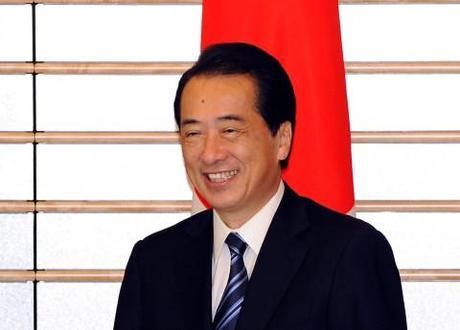
Naoto Kan. Photo credit: Office of the President of Ecuador
It’s that time of year again: as summer starts to fade, the first chill of autumn enters the night air, and another Japanese Prime Minister resigns. Naoto Kan – who announced on Wednesday that he will stand down next week – actually lasted longer than his four immediate predecessors, none of whom lasted longer than a year in the job. Whoever takes over next week will be the Japan’s sixth PM in five years.
As The Independent reported, Mr Kan’s position became untenable after he was “accused of fumbling his government’s response to Japan’s worst natural crisis since the Second World War,” March’s earthquake and tsunami and the resulting disaster at the Fukushima nuclear power plant. Mr Kan, leader of the Democrats (DPJ), had pledged to lead Japan into a nuclear-free future, “a position that immediately put him at odds with party conservatives and the nation’s powerful business lobby.” Moreover, “Polls put his support rate at below the critical 20 percent mark.” As potential successors jockeyed for position, Japan’s ongoing political instability looks set to further damage the country’s already weakened economy.
- Impact of the resignation. The Guardian linked this latest episode in the Japanese political merry-go-round to the country’s economic problems. Ratings agency Moody’s recently reduced Japan’s credit rating to AA3 and, said Philip Moody, “singled out the inability of politicians to make decisions as the main reason for the downgrade.” Japan’s economy is struggling under the costs of growing welfare demands and post-tsunami reconstruction and national debt stands at 200% of GDP. “Some Japanese pundits believe the dysfunctional nature of the country’s democracy has reached a new low,” wrote Inman, “and the parliament is unlikely to get a grip on government finances until the markets refuse to lend any more money.” Mark Mackinnon in The Globe and Mail saw Mr Kan’s departure as symptomatic of deep problems in Japan’s political culture. “As the revolving door at the top illustrates, the problem goes far beyond Mr Kan and speaks to a crippling illness in Japanese politics,” he wrote, “a disease that compounds the already enormous threats to the country’s future.” Mackinnon bemoaned “the perception that it no longer matters whom the Prime Minister of Japan is,” and blamed “Japan’s political system, which allows reviled backroom operators to wield enormous power over their putative leaders,” for stifling Mr Kan’s attempts at reform.
- History of instability. Mr Kan was Japan’s 33rd Prime Minister since 1945, and as Roland Buerk observed at the BBC, “Ask Japanese people about their country’s politicians, and the response is usually eye-rolling exasperation – or despair.” Yasuhiro Tase, professor of Public Management at Waseda University, offered some insight into this systematic instability in a 2008 article ‘Why has Japan had so many PMs?’ for The Association of Japanese Institutes of Strategic Studies. Tase put the blame firmly with a self-serving bureaucracy that offers little or no political support to the PM. “Even the secretary to the prime minister tends to work to protect his own position, rather than the PM’s,” he wrote, and feared that “the day might come soon when no one wishes to become prime minister in Japan.”
- What next? The Daily Telegraph profiled seven members of the DPJ who are lining up to replace Mr Kan. Julian Ryall wrote that former foreign minister Seiji Maehara “appears to have the edge in the race for the top post and is a popular figure with the public,” despite a history of allegations against him of inappropriate behaviour. At The Economist, Banyan profiled another candidate, finance minister, Yoshihiko Noda, and focused on his “talent for saying the wrong thing at the wrong time.” Noda recently angered South Korea by denying Japanese war crimes, and Banyan argued that “he may turn out to be no better at winning friends at home than Mr Kan was – and more inclined to lose them abroad.” Banyan regretted Mr Kan’s resignation because “there is no one obviously better to take his place.” Can whoever steps up last beyond next August?

